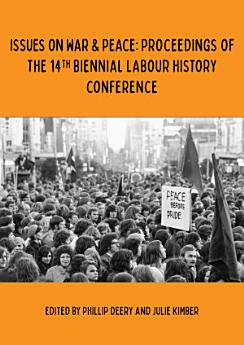ISSUES ON WAR & PEACE: PROCEEDINGS OF THE 14TH BIENNIAL LABOUR HISTORY CONFERENCE
About this ebook
History Conference, 11-13 February 2015. Titled Fighting Against War: Peace
Activism in the Twentieth Century, the conference was held at the University of
Melbourne. A conference book of refereed papers has been published under that title and
these proceedings carry the non-refereed papers received for publication. There is one
exception to that rule: the paper written by Warwick Eather and Drew Cottle, published
below, which underwent double-blind refereeing. It is an important paper, which
demonstrates with compelling evidence that the rabbit was anything but a curse to the
many men, women, and children who took advantage of the rabbit industry’s resilience
during the economic storms for much of the twentieth century. It exemplifies how
meticulous research in labour history can provide an entirely new understanding of an
otherwise much-maligned animal in Australia.
The next three papers all concern opposition to nuclear testing, from the 1950s to the
1980s. When read together, they provide a convincing argument for the importance and
efficacy of the diverse anti-nuclear movements in Australia, New Zealand and the Pacific
Islands. Whilst there are inevitable overlaps, these papers emphasise different and
often neglected dimensions: the struggle for recognition of and compensation for the
devastating effects of nuclear testing; the internal dynamics of the various nuclear
disarmament organisations; and an evaluation of their impact on government policy,
culminating in the Rarotonga Treaty of 1985.
The last three papers cover aspects of World War I, the Cold War, and the Vietnam War.
The first focuses on the role of one redoubtable woman, Ettie Rout, in challenging
popular misconceptions about venereal disease held by military authorities and
the soldiers themselves. The next paper examines the life of a Czech Lutheran pastor,
Professor Josef Hromádka, who visited Australia twice during the 1950s. Hromádka
attempted to juggle Christianity with Socialism, which – in the prevailing climate of
strident anti-communism – provoked hostile receptions and Cold War invective. The final
paper in this collection brings to life, through the reflections of a “participant observer”,
the preparations, conduct and impact of Adelaide’s largest anti-war demonstration: the
protest against the invasion of Iraq in 2003 organised by the NoWar collective. Its efforts,
undertaken by a broad range of rank and file activists, is a fitting reminder, and
exemplar, of the theme of our conference: peace activism in the twentieth century.
About the author
Julie Kimber is an Australian historian based at Swinburne University of Technology. She has edited several book collections on Australian political and labour history. Her research interests include the Cold War, biography, and political/radical/legal history.
Phillip Deery is an historian of the Cold War with a special interest in the impact of communism, anti-communism and espionage on the politics and culture of Australia, Great Britain and the United States.
Nic Maclellan works in the Pacific Islands as a correspondent for Islands Business magazine (Fiji) and has co-authored three books on nuclear issues in the islands region: La France dans la Pacifique (Editions la decouverte, Paris), After Moruroa - France in the South Pacific (Ocean Press, New York and Melbourne) and Kirisimasi (PCRC, Suva).
Jonathan Strauss writes and occasionally teaches in politics and history in Cairns after completing his thesis on the Accord and the politics of workers in 2011 at James Cook University. His ongoing research concerns workers’ political consciousness, including the roles of social and labour movement participation, issues related to the formation of new worker parties and insights offered by Gramsci’s work.
Michael Hamel-Green has published extensively on regional security and regional arms control and disarmament, including a comprehensive study of the South Pacific Nuclear Free Zone Treaty and a brief account of the Nuclear Free and Independent Pacific Movement. His most recent work includes studies of regional denuclearization in Northeast Asia and the Middle East, and a forthcoming book chapter on the role of nuclear weapon free zones as multilateral regional initiatives contributing to global disarmament. He is currently working on a negotiation history of the existing six nuclear weapon free zone treaties.
Jenny Debney-Joyce is a PhD history student at Federation University Ballarat, researching the life of Dr Fanny Reading, a Jewish doctor who studied medicine at the University of Melbourne during World War I.
Doris LeRoy gained her PhD for the study of Anglican attitudes in Australia to communism in the early Cold War from Victoria University. Her interest is in the nexus of Religion and Politics.
David Faber is a labour historian and Executive Member of the Australian Society for the Study of Labour History Adelaide Branch. He is an Executive Member with Jeanie Lucas and Mike Khizam of the Australian Friends of Palestine Association SA.





